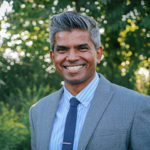I always love to visit Iowa. Iowa helped shape my journey into North America when I began my journey as a bleary-eyed, bushy-tailed 17-year old, just arrived from India and enrolled at Northwestern College. My parents had been the first in my family to visit beautiful Iowa when in 1994, they spent two months traversing the length and breadth of the US for the first time. They still proudly claim, “25 states in 60 days!”
And their favorite state in all the land? It was Iowa. They even brought back a t-shirt for me embroidered with the face of a pig and the words, “Iowa: You make me smile.” I wore that shirt with so much pride despite the negative connotations pigs generally elicit throughout my subcontinental Indian context.
April 27, 2019
Over a year ago, my heart skipped a beat when I heard Rev. Josh Van Leeuwen, pastor of Westview Church in Waukee, Iowa, say, “There is a group of Indians that use our church building to run a language program. I think they speak a language called ‘Tamil.’”
There are hundreds of languages spoken in India, yet this group of Indians spoke mine. As a student at Northwestern College, even in my wildest dreams I could not have imagined a scenario in which there would be a Tamil school in Iowa, and yet, here we were!
When my family moved to the cosmopolitan city of Bangalore in 1983, my parents were determined not to let their children forget the precious language of Tamil in a world where the languages English, Hindi, and Kannada reigned supreme.
So, no matter how many languages we learned, my brother and I have always spoken to my parents in Tamil. In fact, while I ended up learning six languages, I dreamed in Tamil. Tamil was the language of my mother’s songs and lullabies. Tamil was the original language of my heart.
Today, I bear the difficult burden of being the only speaker of this mother tongue in my own family. I try to infuse bits of Tamil into our conversation at home so my family will know the lilt and cadence of this ancient, beautiful, and regal language. At bedtime, I pray for my children in Tamil, and sometimes over meals at the table. I tease them with Tamil slang, and sometimes even talk to our dog in Tamil. It gets a great response.
February 22, 2020
I picked up my car rental from the Des Moines airport and made a dash to Westview Church on a sunny, Saturday afternoon. It was pleasantly jarring to see the tech uniform (polo shirts, jeans, and sneakers) of my South Indian brothers as they greeted me in the church parking lot. I quickly nodded my head to a group of them chatting animatedly outside the church as I made my way inside. Suzanne Lenters, the office administrator of the church, introduced me to a group inside, and I felt an immediate sense of kinship.
That’s the best part about a heart language. Even just a whiff of it in a faraway land can magically transport you back home.
Soon, there were nine of us bobbing heads, talking about how to ferment rice batter in a temperate zone to ensure our idlis would be soft as clouds, and where one might go to find coconut chutney that could change your life. We talked about the kind people of Iowa who generously, and easily, shovel your driveway before you wake up, and we talked about everything else in between.
Eventually, I mustered up enough courage to ask them why they teach Tamil in a church. They mentioned the high price of other locations, but they also told me something that made my heart very happy. They said, “Every time we ask something of the church, they always say ‘yes!’ We use every room in this building except Suzanne’s office!”
They went on to say that the church even let the community gather to celebrate the Tamil harvest festival called Pongal. This is no small feat, as even most Indian churches would be hard pressed to offer space for such activities. In this simple way, Westview Church has allowed one of the scariest places for a non-Christian Indian—a church—to feel warmly welcoming as they have made it their sacred gurukul to teach their heart language to their children.
June 1819
On June 8, 1819, the Reformed Church in America sent its first missionaries, John and Harriet Scudder, to the faraway land of India, where a physician was needed. Their early endeavors led to the establishment of a mission in the North Arcot District of South India, which would eventually lead to the formation of the Church of South India. It is an incredible tale in the annals of RCA Global Mission, and in the story of God’s movement around the world.
Are there any guesses as to the language that was spoken in the North Arcot District? Tamil, of course! For 200 years and 8 months, today, the RCA has had a ministry of medicine, witness, and presence among my beloved Tamil people. And then, so recently, back in the heart of the USA, in beautiful Iowa, a small RCA congregation has faithfully continued the legacy of the ministry of the Scudders, DeJongs, and Heidemans, such faithful missionaries to India.
Personally, this took on an even more meaningful twist for me as my parents were two of the translators of a modern translation of the Tamil Bible. In fact, my father is the voice of the Tamil audio Bible and my mother sat beside him and determined that it was read flawlessly. My brother and I grew up with the sounds of this ancient language washing over us by way of these Tamil audio Scriptures. I shared my family’s story at Westview’s worship service the next morning. The best part, I’d argue, happened when my trembling hands and quaking voice offered the benediction in my heart language, Tamil.
The God who began a good work in us—in the RCA, in the North Arcot District more than 200 years ago—continues to work in the midst of, and through the life of, a beautiful local congregation to reach the same community that finds itself yearning for cloud-like idlis, and a family that welcomes them home again.

JP Sundararajan
Rev. Dr. JP Sundararajan previously served as the director of RCA Global Mission. He is an ordained minister of Word and sacrament, as well as a traveler and storyteller who enjoys dabbling with technology.



